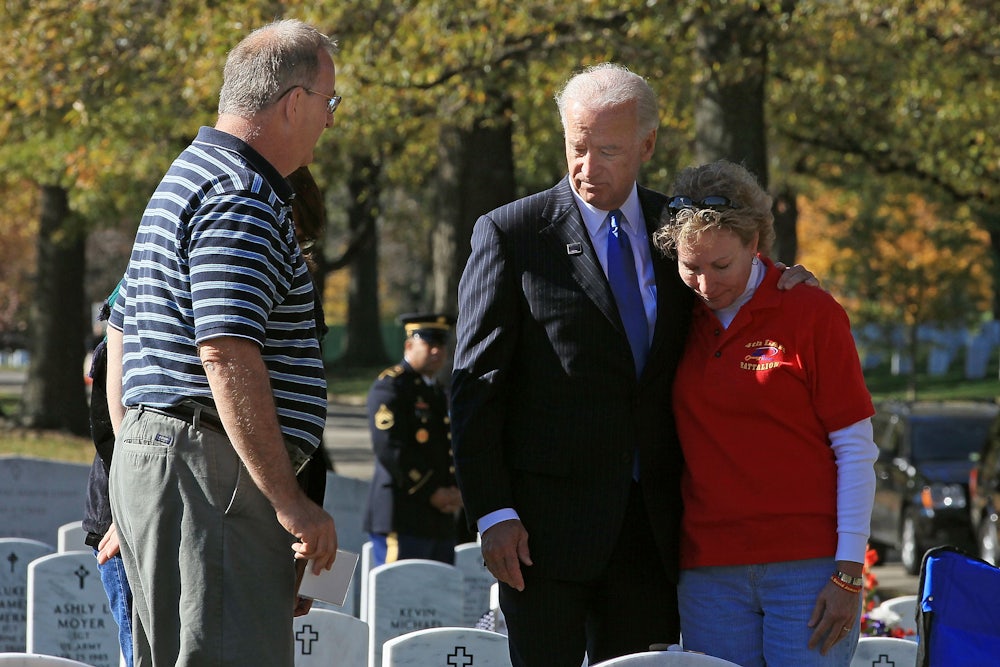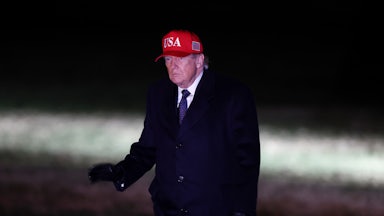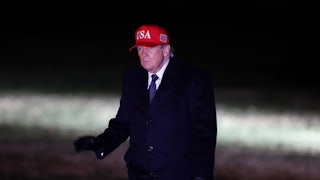Criticism of President Biden over the United States’ chaotic withdrawal from Afghanistan has reached a fever pitch in recent days, amid reports of Americans left stranded and images of Afghans clinging to departing planes. Many of these criticisms are valid: His administration should have done more to make sure the systems and procedures were in place to evacuate our Afghan allies and to expedite the special immigrant visa process. This shouldn’t have to be done after the fact, and it makes it look like we didn’t include our allies in our plans. But much of the broader backlash—laid against the reality that there was no easy or clean way to exit Afghanistan after nearly 20 years, and that every path to doing so involved the Taliban regaining control—feels disingenuous. Are Biden’s critics really upset about the disastrous situation in Afghanistan, or are they just angry that he exposed it?
For the better part of two decades, the American people have been lied to and misled about Afghanistan by many of the same right-wing politicians, talking heads, and advisers who are now criticizing Biden for pulling the curtain back on the extent of the deception. Some of these people were naively hopeful, some were duped, and others knew better but joined in anyway. Among the American public, there was and is an understandable tendency to want to believe that the enormous cost of the war—in lives, in dollars, and in years—was not wasted on a lost cause. So we believed the stories we were told about the so-called war on terrorism, even as the U.S.’s actions backfired, and we bought the narrative they sold us about the need to stay in Afghanistan to protect women and girls, even as it became apparent that women’s rights were not a priority for the Afghan government and even as Taliban attacks against women and girls increased during the first decade of the war.
Maintaining a national fiction like that requires the cooperation of not only top military leaders but also government officials, political elites, academics, journalists, media outlets, and more. As long as the major actors played along, the illusion of victory and success could be maintained. For a very long time, that’s exactly what happened. President Obama played his part, despite declaring that the war was over in 2014. When military commanders recommended a strategy of ramping up in order to scale down, Obama responded by authorizing several surges of troops. And the war carried on. After campaigning on a pledge to bring the troops home, President Trump did his part to maintain the facade. Although he did reduce the number of U.S. troops in Afghanistan to 2,500, Trump also ordered a military surge under the guise of preparing to pull out.
All along, we were fed feel-good stories about defeating terrorists, advancing human rights, and bringing democracy to Afghanistan. All along, we were told that the U.S. and its allies were turning a corner and reaching a turning point, and that the momentum was moving in our direction. Of course, we weren’t, we didn’t, and it wasn’t. But few people in power were willing to say so, and from the earliest days of the war—when Americans were still dealing with the acute trauma of the September 11 attacks and national unity took precedence over almost everything else—questioning the decisions and motives of military leaders was seen as almost un-American.
We were fighting the good war, after all.
At some point down the line, it became apparent that opportunists had taken that moment of national unity and run with it. In the interest of national security, we went along with a series of reckless and costly decisions, and in the name of patriotism, we didn’t question them. No one suffered more from these audacious and often deadly decisions than Afghan civilians. Tens of thousands of Afghans became casualties of the war, and those who survived were left battling elevated rates of disease and post-traumatic stress disorder from the constant threat of drone strikes. Many journalists also got caught up in the moment, resulting in years of coverage that romanticized the war and reinforced a fictional narrative of heroes and villains fighting a battle of good versus evil. Even after it became clear that the U.S. was engaged in a war that we never had a chance of winning, the idea that we should accept the loss and walk away was often framed as a victory for terrorists and tyrants and an imminent threat to national security. You either supported the war or you supported the terrorists. Choose wisely.
Prolonging a disastrous war had become a safer political decision than ending one.
When Biden took office, he was expected to play ball. Like his predecessors, he would commit to ending the war—and like them would actually mean it. But after 20 years, it seemed inevitable that he would continue the tradition of doubling down on mistakes made years ago in order to avoid admitting that those mistakes were made.
But instead, for the first time in 20 years, a U.S. president has pulled back the curtain and exposed a reality we were never meant to see. And for that, Biden is now facing the wrath of those who have long covered for each other by feeding the American public lies and false hope.
Some of Biden’s critics accuse him of “betraying” Afghanistan by abandoning our efforts there, as if we were on track for success before Biden stepped in and ruined everything. Others have blamed Biden for undermining the morale of the Afghan security forces with his withdrawal announcement earlier this year, saying this is a major reason the Afghan military was overtaken so easily by the Taliban.
Maybe it’s more convenient to blame Biden than to admit that we have known about, but failed to address, long-standing problems within the Afghan army, including poorly trained and ill-equipped troops, missing paychecks, raging corruption, and little incentive to reform.
According to a recent watchdog report by the Special Inspector General for Afghanistan Reconstruction, the U.S. was spending $300 million a year to pay the salaries of nonexistent members of the Afghan security forces, known as “ghost soldiers.” A 2016 investigation found that 40 percent of the troops in Helmand Province were fake names or dead men, and in early 2019, at least 42,000 ghost soldiers were removed from the Afghan army’s payroll. Afghan military officers had been pocketing their salaries. The presence of ghost soldiers has been cited as one reason for the Afghan military’s rapid losses at the hands of the Taliban this month, but given that no one knows how many there are, it’s hard to fault Biden for not accounting for this.
Evidence that the U.S. was bungling the ground game goes way back. In 2009, The New York Times reported Afghan police officers saying that high-ranking jobs in the country’s security forces were being auctioned off for tens or hundreds of thousands of dollars to people who then enriched themselves through the drug trade and other illicit activities. At one point, an analysis of thousands of Department of Defense contracts estimated that at least 40 percent of the contracts ended up in the hands of criminals. Investigations of U.S. contractors also found massive amounts of waste, fraud, and corruption.
There were many signs that the Afghan security forces would crumble under a Taliban onslaught. The district of Nawa, for example—widely touted as one of the successes of the U.S. counterinsurgency strategy—fell back under Taliban control in 2016 after U.S. troops started leaving the area. Local elders said they had long complained to the government about the corruption that plagued security forces in the area but that nothing had been done. Nawa remained under Taliban control until U.S. forces returned.
These stories of defeat didn’t fit into the optimistic narrative that was used to justify our presence in Afghanistan. Instead, in press release after press release, the U.S. military celebrated its work building schools and distributing school supplies to children in previously Taliban-controlled regions—an initiative hailed as the foundation to providing security in Afghanistan. Educating Afghan girls became the signature issue of former First Lady Laura Bush, who often used their plight to justify U.S. military actions in the country. Millions of girls who had previously been banned from attending school by the Taliban started receiving an education. By 2015, the number of Afghan schoolchildren had increased to an estimated 8.4 million from one million in 2001. By 2020, that number had risen to more than 9.5 million, 39 percent of whom were girls.
These achievements made the American public feel better about the war. And they are certainly worth celebrating—to the extent that they actually exist. But lost in these feel-good stories is an ugly reality. As Buzzfeed News reported in 2015, many of the claims about the success of U.S.-backed efforts to build Afghanistan’s education system were severely exaggerated and some were downright lies.
“[T]he government peddled numbers it knew to be false and touted schools that have never seen a single student,” Buzzfeed News reported. “The American effort to educate Afghanistan’s children was hollowed out by corruption and by short-term political and military goals that, time and again, took precedence over building a viable school system. And the U.S. government has known for years that it has been peddling hype.”
As we now know, this was not an isolated incident. According to the 2019 Afghanistan Papers, a series of confidential U.S. government documents published by The Washington Post, “senior U.S. officials failed to tell the truth about the war in Afghanistan throughout the 18-year campaign, making rosy pronouncements they knew to be false and hiding unmistakable evidence the war had become unwinnable.” The documents, which contain hundreds of interviews with top military and government officials, showed that the leaders of the war effort were privately expressing deep skepticism and uncertainty about Afghanistan while publicly giving optimistic reports about progress and future goals. Several officials said there was no plan on the ground and admitted they had no idea what the U.S. was even doing there, who they were fighting for, or what they were fighting to achieve.
This situation persisted because people in power kept covering up for other people in power. Opposing voices were marginalized—a problem that continues to this day, as prominent figures supporting the withdrawal of U.S. troops find it difficult to get booked for media appearances and interviews. America is great at starting wars, but not so good at ending them. As the fog of war lifts and the extent of the deception becomes clearer, there’s still an effort to maintain the illusion by blaming the disaster on the administration that exposed it rather than those who caused it.
Much of the outrage aimed at Biden is not about the U.S. exiting Afghanistan or even about the tragic legacy we’re leaving behind, but about the fact that Biden pulled back the curtain and revealed America’s failures while the world was watching. Many of the individual concerns are valid: It’s absolutely true that our Afghan allies are facing a horrific situation and some are likely to be detained, beaten, or even killed by the Taliban. Women and girls are likely to be forced back out of society as the country succumbs to the cruel oppression of the Taliban, and any advancements in human rights made in the past 20 years will likely be rolled back. Afghanistan faces a violent, uncertain future—but for reasons that have been apparent through multiple presidential administrations, possibly as far back as the Cold War, not because Biden mishandled the withdrawal of U.S. troops.
It’s also true that America’s credibility on the world stage is at risk. But Biden isn’t responsible for that, either. The reason our credibility is at risk globally is also the reason it’s at risk at home: people we trusted lied to us and then sold us a war to keep those lies covered up. If anything, Biden’s approach of ripping off the Band-Aid and exposing the ugly truth of war may actually bolster our credibility. After all, the people trying to spin Biden’s actions as a “disaster” and an “embarrassing failure” are also the ones who spent 20 years spinning us in circles with false reassurances about turning a corner. If it weren’t for Biden, they’d still be doing it.




